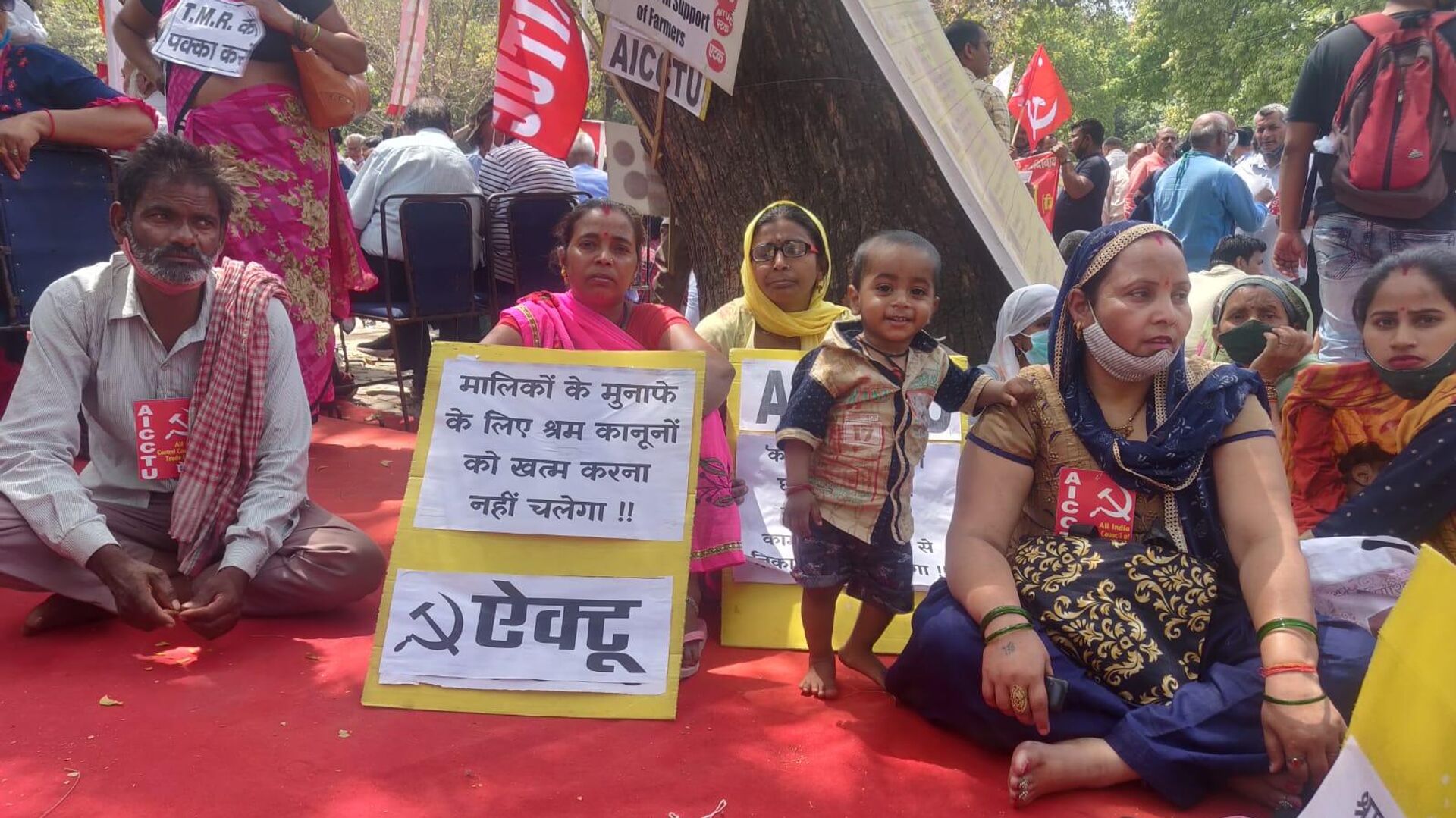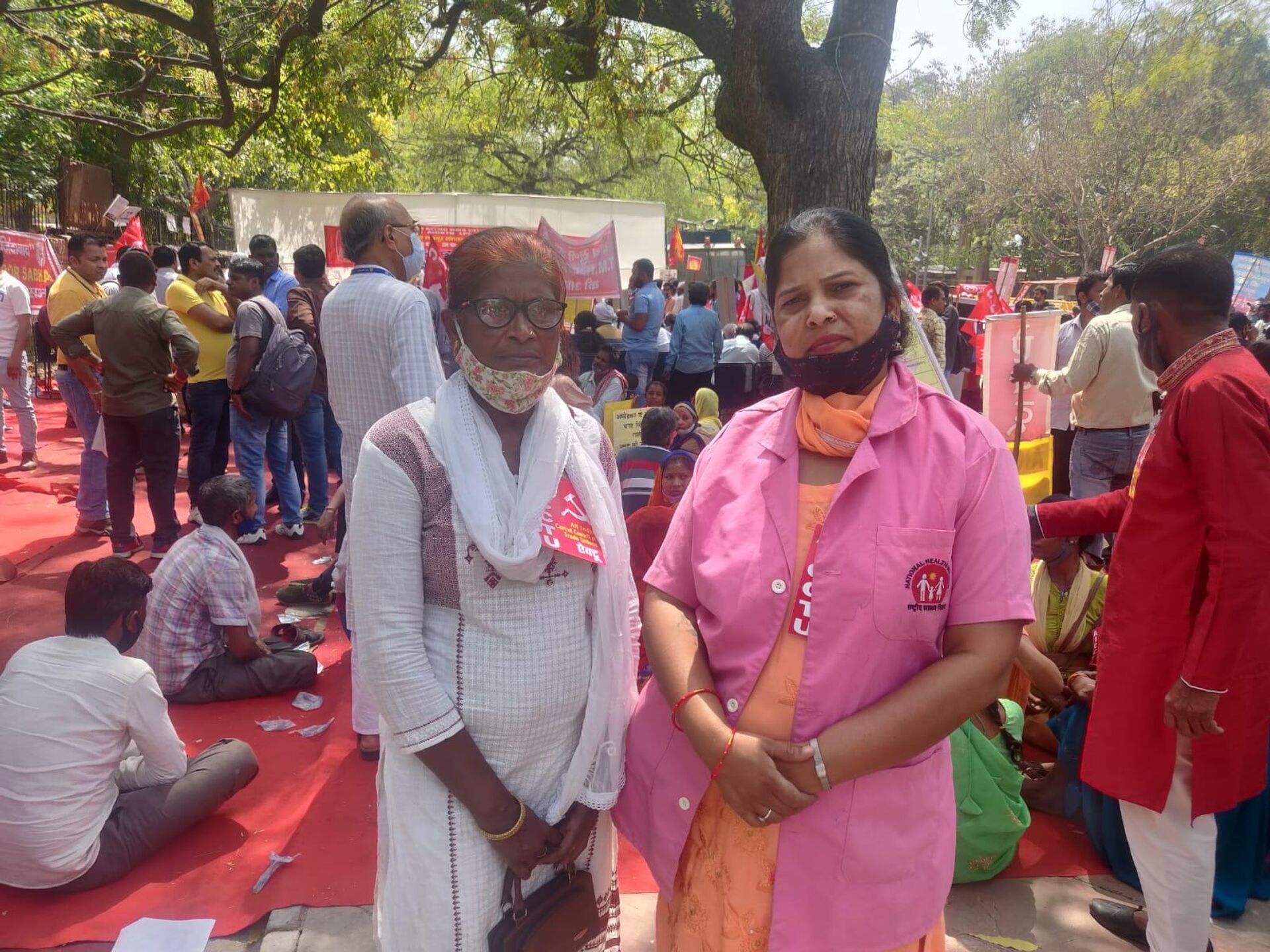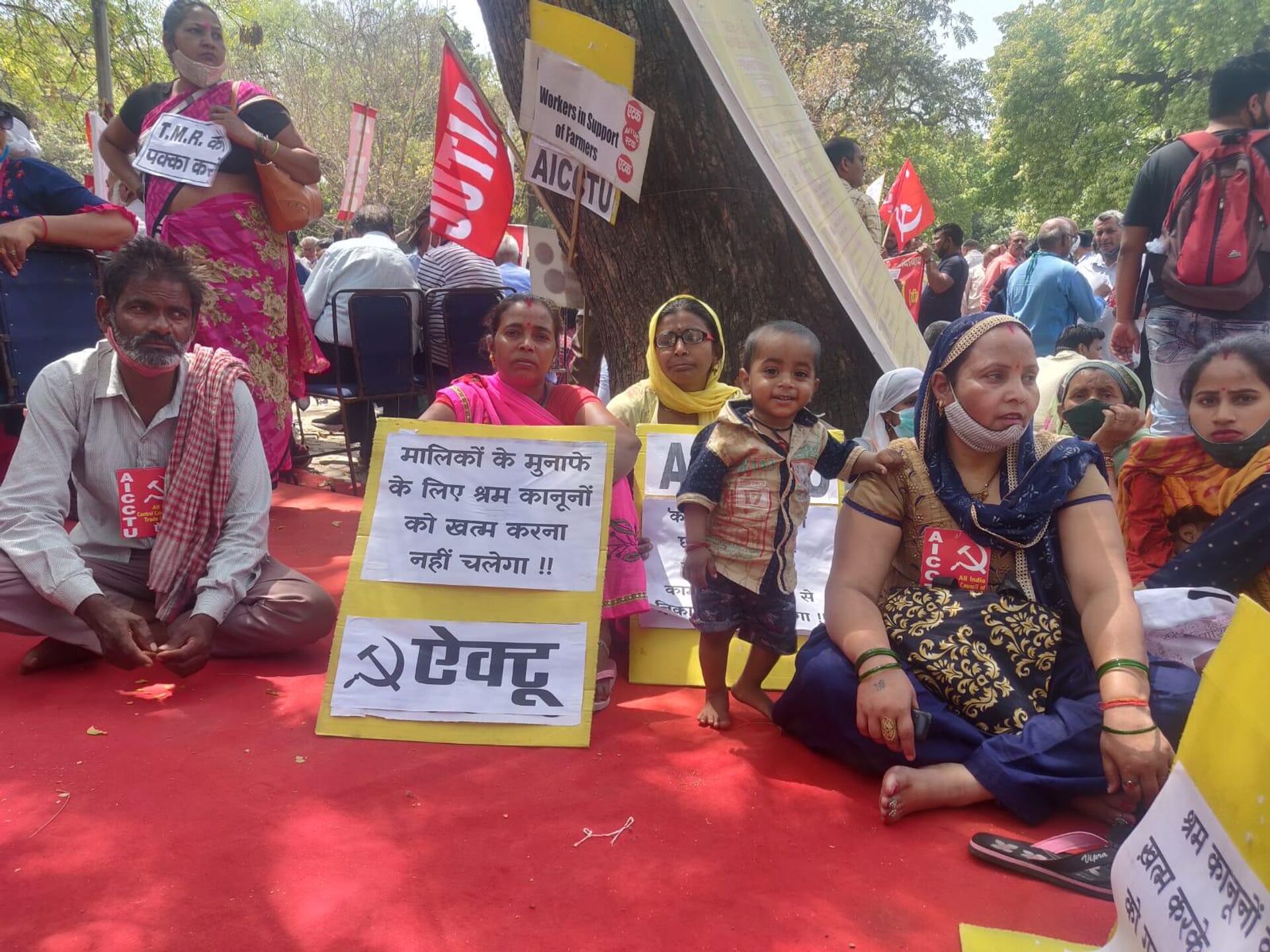https://sputnikglobe.com/20220405/over-a-million-healthcare-workers-in-india-are-fighting-for-recognition-better-pay-1094465163.html
Over a Million Healthcare Workers in India Are Fighting for Recognition, Better Pay
Over a Million Healthcare Workers in India Are Fighting for Recognition, Better Pay
Sputnik International
During the pandemic, Accredited Social Health Activists (ASHA) formed the backbone of the rural healthcare system in the country. PM Modi also hailed their... 05.04.2022, Sputnik International
2022-04-05T08:28+0000
2022-04-05T08:28+0000
2022-07-19T10:43+0000
delhi
new model
healthcare
health workers
https://cdn1.img.sputnikglobe.com/img/07e6/04/04/1094467852_0:151:1599:1050_1920x0_80_0_0_ff10794da659174a18e6a9e9c1a622f4.jpg
Over the past 18 months, hundreds of thousands of ASHA workers across India have been raising their voices for recognition of their work, better pay, and identity.There are currently a little over a million ASHA workers, primarily women, in the country, according to the federal Health Ministry. Dressed in pink coats, ASHA workers, also known as frontline workers, have paid door-to-door visits for months to ensure that people get COVID-19 vaccines, even in remote parts of the country.When COVID's first and second waves hit India, these workers were hailed as "COVID Warriors", with Prime Minister Narendra Modi giving them a nod.The primary responsibilities of the ASHA workers were contract tracing, spreading public awareness on the prevention of COVID, watching incoming migrants to ensure they follow quarantine protocols and report suspected affected cases.The ASHA programme was originally created in 2005 to eradicate life-threatening polio across the country, a goal that was achieved in 2014.Now, these health workers are assigned a different role as per state government requirements.However, despite playing a major role in the country's primary healthcare system, most of these workers get an honorarium, which averages about INR 3,000 ($40) per month, the Karnataka state government gives the highest honorarium — INR 10,000 ($131).Speaking with Sputnik, Reeta Bharadwaj, a health activist (ASHA) working with the Delhi government since 2008, says, "Sadly, the government doesn't recognise us in their rule book".ASHA workers are envisaged as voluntary activists by the state government, and they do not have fixed salaries.She stresses their demand is to be granted the "status of government employees and hence facilities like retirement benefits, pensions, medical benefits, paid leave, travel allowances, etc. that adhere to the labour laws"."In many states, including Uttar Pradesh, Maharashtra, and Punjab, getting a timely wage is also a concern", said Shweta Raj, the president of the Dilli ASHA Kamgar Union (a union of health activists).She highlights that many frontline workers tested positive for COVID-19 at the time but none were granted leave or compensation in such a situation."Most of the time, even the death of these workers was not recognised as death due to COVID, due to improper diagnosis", Raj explained.In the state of Andhra Pradesh, over 150 ASHA workers were feared to have died due to COVID-19. But the government paid compensation to only 10 families, alleged the state's ASHA workers.At the beginning of March, Delhi ASHA workers held a massive protest demanding money and benefits.ASHA workers have swept across Delhi, and the states of Maharashtra, Telangana, Punjab, Karnataka, Uttar Pradesh, and Haryana.Violence and DiscriminationWhile playing their role to bridge the gap between society and reaching out to individuals, these health activists are often bullied by the community.For example, in a recent incident in March, men from the Buldhana district in the state of Maharashtra accused ASHA workers of corrupting their wives when they used a rubber penis to demonstrate how a condom is used.Last year, in Maharashtra Nagpur's district 3,000 ASHA workers alleged that they faced increased verbal abuse. Last October, an ASHA worker claimed that a doctor beat her up at the Bhawanipatna District Headquarters Hospital (DHH) in the state of Odisha.In June, an ASHA worker in Uttar Pradesh's Gorakhpur was allegedly abused and assaulted when she went to a village to collect details about residents' COVID-19 vaccination status.According to a report published in 2020, as many as 33 percent of healthcare workers face verbal abuse or violence in India. Following this, the government declared violence against healthcare workers an offence punishable by up to seven years' imprisonment after various episodes of violence and harassment of healthcare workers involved in COVID-19 care or contact tracing.Let's stay in touch no matter what! Follow our Telegram channel to get all the latest news: https://t.me/sputniknewsus
delhi
Sputnik International
feedback@sputniknews.com
+74956456601
MIA „Rossiya Segodnya“
2022
Deexa Khanduri
https://cdn1.img.sputnikglobe.com/img/07e4/0c/1e/1081607388_0:0:961:960_100x100_80_0_0_e9e931b8c1e18fb41f3074e2145d7a3a.jpg
Deexa Khanduri
https://cdn1.img.sputnikglobe.com/img/07e4/0c/1e/1081607388_0:0:961:960_100x100_80_0_0_e9e931b8c1e18fb41f3074e2145d7a3a.jpg
News
en_EN
Sputnik International
feedback@sputniknews.com
+74956456601
MIA „Rossiya Segodnya“
Sputnik International
feedback@sputniknews.com
+74956456601
MIA „Rossiya Segodnya“
Deexa Khanduri
https://cdn1.img.sputnikglobe.com/img/07e4/0c/1e/1081607388_0:0:961:960_100x100_80_0_0_e9e931b8c1e18fb41f3074e2145d7a3a.jpg
delhi, new model, healthcare, health workers
delhi, new model, healthcare, health workers
Over a Million Healthcare Workers in India Are Fighting for Recognition, Better Pay
08:28 GMT 05.04.2022 (Updated: 10:43 GMT 19.07.2022) Deexa Khanduri
Sputnik correspondent
During the pandemic, Accredited Social Health Activists (ASHA) formed the backbone of the rural healthcare system in the country. PM Modi also hailed their contribution. However, ASHA workers are now protesting for better pay, working gear, and other benefits -- concerns continuously being ignored by states and the federal government.
Over the past 18 months, hundreds of thousands of
ASHA workers across India have been raising their voices for recognition of their work, better pay, and identity.
There are currently a little over a million ASHA workers, primarily women, in the country, according to the
federal Health Ministry.
Dressed in pink coats, ASHA workers, also known as frontline workers, have paid door-to-door visits for months to ensure that people get COVID-19 vaccines, even in remote parts of the country.
When COVID's first and second waves hit India, these workers were hailed as "COVID Warriors", with Prime Minister Narendra Modi giving them a nod.
The primary responsibilities of the ASHA workers were contract tracing, spreading public awareness on the prevention of COVID, watching incoming migrants to ensure they follow quarantine protocols and
report suspected affected cases.
"During the pandemic not just the health workers' burden of work increased, they had to continue working even without gloves, PPE kits, masks, or sanitisers", T. Sundararaman, a New Delhi-based global coordinator for the People's Health Movement, says.
The ASHA programme was originally created in 2005 to eradicate life-threatening polio across the country, a goal that was achieved in 2014.
Now, these health workers are assigned a different role as per state government requirements.
However, despite playing a major role in the
country's primary healthcare system, most of these workers get an honorarium, which averages about INR 3,000 ($40) per month, the Karnataka state government gives the highest honorarium — INR 10,000 ($131).
Speaking with Sputnik, Reeta Bharadwaj, a health activist (ASHA) working with the Delhi government since 2008, says, "Sadly, the government doesn't recognise us in their rule book".
ASHA workers are envisaged as voluntary activists by the state government, and they do not have fixed salaries.
"Unlike other workers, we're neither labourers nor workers. Our duty is termed as 'service for the nation'. And our earning is termed as 'honorarium' which is problematic for us", she says. "If we were recognised as labourers, the government would have paid us minimum wages, INR 10,000 ($131)".
She stresses their demand is to be granted the "status of government employees and hence facilities like retirement benefits, pensions, medical benefits, paid leave, travel allowances, etc. that adhere to the labour laws".
"In many states, including Uttar Pradesh, Maharashtra, and Punjab, getting a timely wage is also a concern", said Shweta Raj, the president of the Dilli ASHA Kamgar Union (a union of health activists).
She highlights that many frontline workers tested positive for COVID-19 at the time but none were granted leave or
compensation in such a situation.
"Most of the time, even the death of these workers was not recognised as death due to COVID, due to improper diagnosis", Raj explained.
In the state of Andhra Pradesh, over 150 ASHA workers were feared to have died due to COVID-19. But the government paid compensation to only 10 families, alleged the state's ASHA workers.
At the beginning of March, Delhi ASHA workers held a massive protest demanding money and benefits.
ASHA workers have swept across Delhi, and the states of Maharashtra, Telangana, Punjab, Karnataka, Uttar Pradesh, and Haryana.
Violence and Discrimination
While playing their role to bridge the gap between society and reaching out to individuals, these health activists are often bullied by the community.
For example, in a recent incident in March, men from the Buldhana district in the state of Maharashtra accused ASHA workers of corrupting their wives when they used a rubber penis to demonstrate how a condom is used.
Last year, in Maharashtra Nagpur's district 3,000 ASHA workers
alleged that they faced increased verbal abuse.
Last October, an ASHA worker
claimed that a doctor beat her up at the Bhawanipatna District Headquarters Hospital (DHH) in the state of Odisha.
In June, an ASHA worker in Uttar Pradesh's Gorakhpur
was allegedly abused and assaulted when she went to a village to collect details about residents' COVID-19 vaccination status.
According to a report published in 2020, as many as 33 percent of healthcare workers face verbal abuse or violence in India. Following this, the government declared violence against healthcare workers an offence punishable by up to seven years' imprisonment after various episodes of violence and harassment of
healthcare workers involved in COVID-19 care or contact tracing.
Let's stay in touch no matter what! Follow our Telegram channel to get all the latest news: https://t.me/sputniknewsus 



